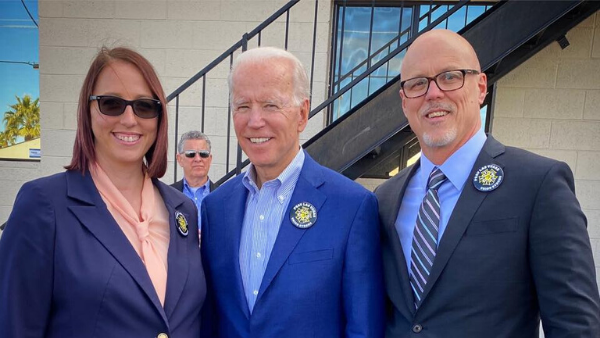
“Researchers have found that today’s union households earn up to 20% more than non-union households, with an even greater union advantage for workers with less formal education and workers of color.”
The words, though, about the benefits of unions, come from the White House Task Force on Worker Organizing and Empowerment, comprised of 13 Biden cabinet members, and chaired by Vice President Harris.
“The report comes amid a surge in interest in unions in the U.S. and follows a wave of high-profile industrial actions last year.” Among those actions, of course, were events like the Kellogg’s factory walkouts, the John Deere strike, various teachers’ actions, and of course the high-profile near-strike in our very own industry. Which, since that industry is fundamentally involved in media, got more than a bit of coverage.
Since this column is going live just ahead of Presidents’ Day, it brings up the question of which Presidents, or administrations, have been best for unions, and which have been worst. Joe Biden is largely regarded as the most unabashedly pro-labor President since FDR, and indeed, the aforementioned task force recently made “70 recommendations to encourage union membership in the U.S. on Monday, including making it easier for many federal employees to join unions and eliminating barriers for union organizers to talk with workers on federal property.”
Which is all well and good if you work on or around federal property. But nothing too overtly “pro-worker” is going to be getting through this Congress — specifically, its Senate half — anytime soon.
And even the question of which Presidencies have been best for labor isn’t as simple as it sounds: A web search yields myriad links on which Presidents have been best for the economy, taken as a whole.
Which can sometimes mean “good for corporate profits, and stock returns,” or “good for workers,” or occasionally even both. In terms of the highest percentage of created jobs, we’re back to Mr. Roosevelt again, who was, after all, pulling the country out of the depths of the Great Depression (and who, for his efforts, also faced a form of “political discourse” when the “economic royalists,” as he termed them, planned a coup to dislodge him from office).
But in terms of numbers of jobs, both Reagan and Clinton surpassed him (though it’s worth noting there were also simply more Americans by then.) Does that also mean that each of those Presidents was better for workers? Reagan, after all, helped pave the way for decades of anti-union backlash with his break-up of the air traffic controllers union, and made unemployment benefits taxable, while Clinton, of course, signed on to NAFTA (which had been in the works since… Reagan).
President Harry Truman is generally regarded as having been pretty good for workers — after all, he vetoed the Taft-Hartley Act (and was overridden), and had a good relationship with unions, at least initially, supporting a brewing steelworkers strike — until he went to court later to try and nationalize production, so there’d be enough raw material available for the war in Korea.
Truman was also faced with inflation and supply chain shortages (sound familiar?), particularly when it came, literally, to meat-on-the-table, and the ever-snarky GOP captured Congress for the first time since the Hoover era, with slogans like “To Err is Truman.” This, however, allowed Truman to run against the Republican Congress, and win full election as President in 1948.
But Truman also signed an Executive Order demanding federal employees be screened for “loyalty,” this in the midst of one of the regularly recurring Red Scares that were also often used to shut down labor organizing, as with the “Palmer Raids,” named for the Attorney General under Woodrow Wilson, that frequently targeted the old Wobblies – the International Workers of the World.
There’s much else to be written about just that sliver of American history — and much already has — but it explains, in part, why one result has been that American labor unions have often been more conservative than their European counterparts.
Meanwhile, Truman’s Executive Order gave rise to a previously little known senator from Wisconsin named Joe McCarthy, who was able to wave around blank pieces of paper with the names of “known Communists” allegedly working in the State Department and denounce the terrible job the Truman administration was doing in keeping us safe from these various Marxian phantoms.
Concurrently, it was HUAC –- the House UnAmerican Activities Committee –- that gave rise, in this same atmosphere, to the hearings that would eventually ruin lives, and lead to what became the Hollywood Blacklist. Among the first people to testify for the urgent need to root out “Reds” from Hollywood were none other than Ronald Reagan, and Walt Disney (the latter had accused outside agitation as being the sole cause of an earlier animators’ strike at his studio).
And it should also be noted that at that time, Congress was controlled by Democrats.
Truman’s order, by the way, also included anyone who sought “to alter the form of Government of the United States by unconstitutional means,” which would certainly make things interesting for various current members of Congress as well as certain ex-executive office holders, etc.
But we digress. Truman was defeated for re-election by Eisenhower, of course, who was so popular after the war that he probably would have been a shoo-in no matter what. And hey, Ike built highways across the country, and what a ton of jobs that brought! But then again, he also further tightened that “loyalty” order that Truman had put on the books. And his cabinet also engineered coups against elected governments in Iran and Guatemala, the latter, in part, due to the influence of the United Fruit Company, which wanted to stop both land use and workplace reforms.
The Hollywood Blacklist, meanwhile — coming from the House, more than McCarthy’s Senate — wasn’t the direct responsibility of either Truman or Eisenhower, but it should be noted that neither administration was about to stop the damage they were causing (lest, presumably, they look “soft on Communism,” an old chestnut that may be on the cusp of getting rebirthed in our present age.)
So were those administrations ‘good for jobs?’ Or ‘good for labor?’ Well, it probably depends on who you ask — whether they were busy building highways or packing up their house in L.A. because they suddenly had to move to England or France to keep working in movies, or whether they were on the wrong end of a death squad somewhere outside the U.S. And while a President doesn’t entirely create the era in which they lead, they certainly reflect eras and help shape them.
Although, in a time of such rapid and ambient unraveling — from the global climate to our collective sanity — a question remains of how much suasion Presidents will still have going forward, including with unions. After all, there’s only so much that our leaders can control. The true power lies with the people.
 Mark London Williams is a BTL alum who currently covers Hollywood, its contents and discontents, in his recurring “Across the Pond” dispatch for British Cinematographer magazine, contributes to other showbiz and production-minded sites, and musters out the occasional zombie, pandemic-themed, or demon-tinged book and script, causing an increased blurring in terms of what still feels like “fiction.”
Mark London Williams is a BTL alum who currently covers Hollywood, its contents and discontents, in his recurring “Across the Pond” dispatch for British Cinematographer magazine, contributes to other showbiz and production-minded sites, and musters out the occasional zombie, pandemic-themed, or demon-tinged book and script, causing an increased blurring in terms of what still feels like “fiction.”
Mark London Williams’Union Roundup column will appear every Tuesday. You can reach him to give him tips and feedback at [email protected]. He can also be found on Twitter @TricksterInk.






